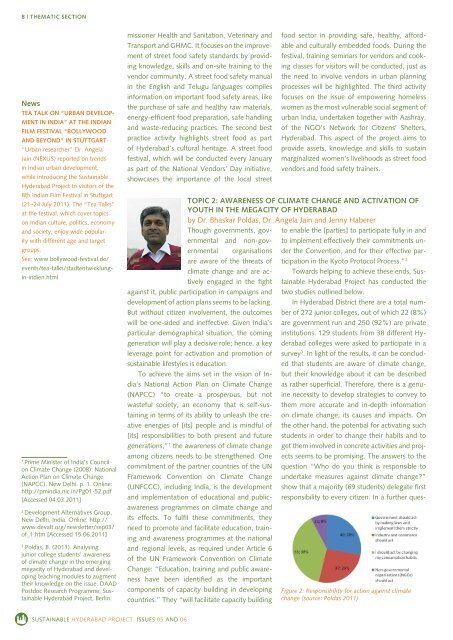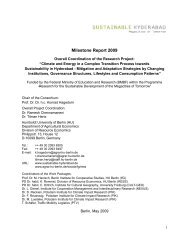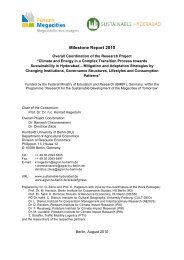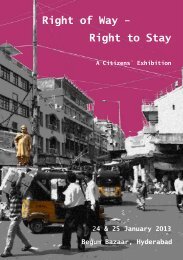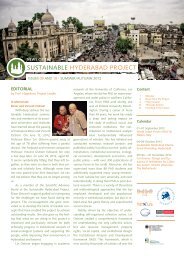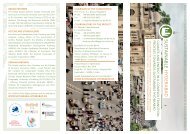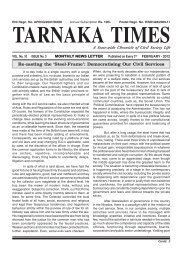SUSTAINABLE HYDERABAD PROJECT
SUSTAINABLE HYDERABAD PROJECT
SUSTAINABLE HYDERABAD PROJECT
You also want an ePaper? Increase the reach of your titles
YUMPU automatically turns print PDFs into web optimized ePapers that Google loves.
8 | THEMATIC SECTION EDITORIAL<br />
News<br />
TEA TALK ON “URBAN DEVELOP-<br />
MENT IN INDIA” AT THE INDIAN<br />
FILM FESTIVAL “BOLLYWOOD<br />
AND BEYOND” IN STUTTGART<br />
“Urban researcher” Dr. Angela<br />
Jain (NEXUS) reported on trends<br />
in Indian urban development,<br />
while introducing the Sustainable<br />
Hyderabad Project to visitors of the<br />
8th Indian Film Festival in Stuttgart<br />
(21–24 July 2011). The “Tea Talks”<br />
at the festival, which cover topics<br />
on Indian culture, politics, economy<br />
and society, enjoy wide popularity<br />
with different age and target<br />
groups.<br />
See: www.bollywood-festival.de/<br />
events/tea-talks/stadtentwicklungin-indien.html<br />
1<br />
Prime Minister of India’s Council<br />
on Climate Change (2008): National<br />
Action Plan on Climate Change<br />
(NAPCC). New Delhi. p. 1. Online:<br />
http://pmindia.nic.in/Pg01-52.pdf<br />
[Accessed 04.03.2011]<br />
2<br />
Development Alternatives Group,<br />
New Delhi, India. Online: http://<br />
www.devalt.org/newsletter/sep03/<br />
of_1.htm [Accessed 15.06.2011]<br />
3<br />
Poldas, B. (2011). Analysing<br />
junior college students’ awareness<br />
of climate change in the emerging<br />
megacity of Hyderabad and developing<br />
teaching modules to augment<br />
their knowledge on the issue. DAAD<br />
Postdoc Research Programme, Sustainable<br />
Hyderabad Project, Berlin.<br />
missioner Health and Sanitation, Veterinary and<br />
Transport and GHMC. It focuses on the improvement<br />
of street food safety standards by providing<br />
knowledge, skills and on-site training to the<br />
vendor community. A street food safety manual<br />
in the English and Telugu languages compiles<br />
information on important food safety areas, like<br />
the purchase of safe and healthy raw materials,<br />
energy-efficient food preparation, safe handling<br />
and waste-reducing practices. The second best<br />
practice activity highlights street food as part<br />
of Hyderabad’s cultural heritage. A street food<br />
festival, which will be conducted every January<br />
as part of the National Vendors’ Day initiative,<br />
showcases the importance of the local street<br />
TOPIC 2: AWARENESS OF CLIMATE CHANGE AND ACTIVATION OF<br />
YOUTH IN THE MEGACITY OF <strong>HYDERABAD</strong><br />
by Dr. Bhaskar Poldas, Dr. Angela Jain and Jenny Haberer<br />
Though governments, gov-<br />
to enable the [parties] to participate fully in and<br />
ernmental and non-governmental<br />
organisations<br />
are aware of the threats of<br />
climate change and are actively<br />
engaged in the fight<br />
against it, public participation in campaigns and<br />
development of action plans seems to be lacking.<br />
But without citizen involvement, the outcomes<br />
will be one-sided and ineffective. Given India’s<br />
particular demographical situation, the coming<br />
generation will play a decisive role; hence, a key<br />
leverage point for activation and promotion of<br />
sustainable lifestyles is education.<br />
To achieve the aims set in the vision of India’s<br />
National Action Plan on Climate Change<br />
(NAPCC) “to create a prosperous, but not<br />
wasteful society, an economy that is self-sustaining<br />
in terms of its ability to unleash the creative<br />
energies of [its] people and is mindful of<br />
[its] responsibilities to both present and future<br />
generations,” 1 the awareness of climate change<br />
among citizens needs to be strengthened. One<br />
commitment of the partner countries of the UN<br />
Framework Convention on Climate Change<br />
(UNFCCC), including India, is the development<br />
and implementation of educational and publicawareness<br />
programmes on climate change and<br />
its effects. To fulfil these commitments, they<br />
need to promote and facilitate education, training<br />
and awareness programmes at the national<br />
and regional levels, as required under Article 6<br />
of the UN Framework Convention on Climate<br />
Change: “Education, training and public awareness<br />
have been identified as the important<br />
components of capacity building in developing<br />
countries.” They “will facilitate capacity building<br />
food sector in providing safe, healthy, affordable<br />
and culturally embedded foods. During the<br />
festival, training seminars for vendors and cooking<br />
classes for visitors will be conducted, just as<br />
the need to involve vendors in urban planning<br />
processes will be highlighted. The third activity<br />
focuses on the issue of empowering homeless<br />
women as the most vulnerable social segment of<br />
urban India, undertaken together with Aashray,<br />
of the NGO’s Network for Citizens’ Shelters,<br />
Hyderabad. This aspect of the project aims to<br />
provide assets, knowledge and skills to sustain<br />
marginalized women’s livelihoods as street food<br />
vendors and food safety trainers.<br />
to implement effectively their commitments under<br />
the Convention, and for their effective participation<br />
in the Kyoto Protocol Process.” 2<br />
Towards helping to achieve these ends, Sustainable<br />
Hyderabad Project has conducted the<br />
two studies outlined below.<br />
In Hyderabad District there are a total number<br />
of 272 junior colleges, out of which 22 (8%)<br />
are government run and 250 (92%) are private<br />
institutions. 129 students from 38 different Hyderabad<br />
colleges were asked to participate in a<br />
survey 3 . In light of the results, it can be concluded<br />
that students are aware of climate change,<br />
but their knowledge about it can be described<br />
as rather superficial. Therefore, there is a genuine<br />
necessity to develop strategies to convey to<br />
them more accurate and in-depth information<br />
on climate change, its causes and impacts. On<br />
the other hand, the potential for activating such<br />
students in order to change their habits and to<br />
get them involved in concrete activities and projects<br />
seems to be promising. The answers to the<br />
question “Who do you think is responsible to<br />
undertake measures against climate change?”<br />
show that a majority (69 students) delegate first<br />
responsibility to every citizen. In a further ques-<br />
Figure 2: Responsibility for action against climate<br />
change (source: Poldas 2011)<br />
<strong>SUSTAINABLE</strong> <strong>HYDERABAD</strong> <strong>PROJECT</strong> ISSUES 05 AND 06


